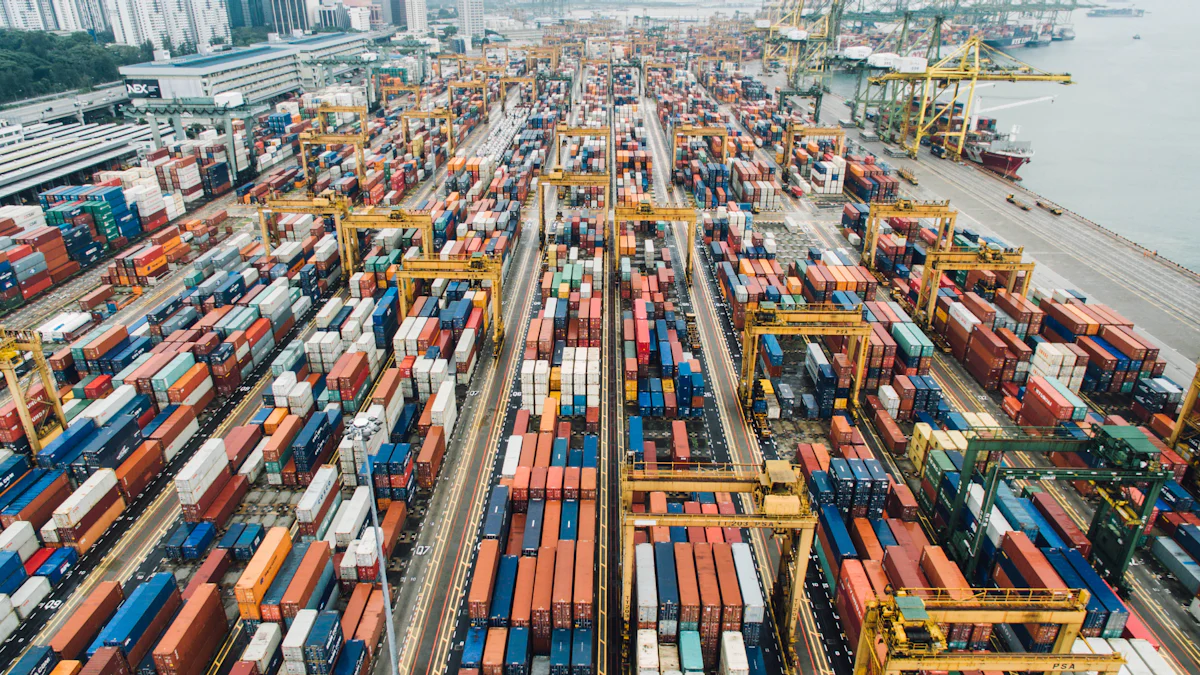In-Depth Analysis of Car Logistics and Its Challenges

Car logistics involves the transportation, storage, and distribution of vehicles from manufacturers to consumers. Efficient car logistics ensures timely delivery, cost control, and customer satisfaction. The automotive industry relies on streamlined logistics to maintain a competitive edge. Effective logistics operations reduce delays and minimize costs. The sector faces numerous challenges that impact its efficiency. An in-depth analysis reveals the complexities and solutions within car logistics.
In-Depth Analysis of Car Logistics
Definition and Scope
What is Car Logistics?
Car logistics involves the systematic management of transporting, storing, and distributing vehicles from manufacturers to end consumers. The process includes multiple stages such as land, sea, and air transport, warehousing, and inventory management. Effective car logistics ensures that vehicles reach their destinations efficiently and safely.
Key Components of Car Logistics
Car logistics comprises several key components:
Land Transportation: Road and rail transport play crucial roles in moving vehicles within and between countries. Companies like JUSDA utilize extensive road networks for continuous service and cross-border freight.
Sea Transportation: Ocean freight is vital for international car logistics. Shipping services offer various modes, including full-container load (FCL) and less-than-container load (LCL).
Air Transportation: Air freight, though costly, is used for urgent deliveries and high-value vehicles.
Warehousing and Inventory Management: Advanced solutions like cloud warehouses support multi-channel sales and ensure efficient warehouse logistics management.
Importance in the Automotive Industry
Impact on Supply Chain
Car logistics significantly impacts the automotive supply chain. Efficient logistics operations reduce delays and minimize costs. Strategic measures, such as those implemented by BMW's San Luis Potosí Plant, enhance transparency and predictive tools, leading to a more sustainable logistics strategy. The agility and strong partnerships in logistics operations ensure a smooth supply chain flow.
Role in Customer Satisfaction
Customer satisfaction hinges on timely vehicle delivery. Effective car logistics plays a pivotal role in meeting customer expectations. For instance, Carter's proactive approach during the pandemic reduced overall transportation costs for a Tier 1 supplier, demonstrating continuous improvement and cost avoidance strategies. Enhanced logistics operations lead to higher customer satisfaction by ensuring vehicles arrive on time and in excellent condition.
Major Challenges in Car Logistics

Transportation Issues
Traffic Congestion
Traffic congestion presents a significant challenge in car logistics. Urban areas often experience heavy traffic, causing delays in vehicle deliveries. For example, the surge in Chinese vehicle imports has led to congestion in major Pacific ports in Mexico. This congestion increases logistical costs and results in delivery delays. Efficient route planning and real-time traffic monitoring can help mitigate these issues.
Fuel Costs
Fuel costs directly impact the efficiency of car logistics. Fluctuating fuel prices can lead to increased transportation expenses. Companies must optimize routes and consider alternative fuels to manage these costs effectively. Utilizing intermodal transportation, such as combining road and rail transport, can also help reduce fuel consumption and costs.
Regulatory and Compliance Challenges
Environmental Regulations
Environmental regulations impose strict standards on car logistics operations. Governments worldwide emphasize reducing carbon emissions and promoting sustainable practices. Compliance with these regulations requires significant investment in green logistics practices. Companies must adopt eco-friendly technologies and processes to meet these standards.
Safety Standards
Safety standards play a crucial role in car logistics. Adherence to these standards ensures the safe transportation and handling of vehicles. Regulatory bodies enforce stringent safety measures to protect both the workforce and the environment. Regular training and audits help companies stay compliant with these safety standards.
Technological Challenges
Integration of New Technologies
The integration of new technologies poses a challenge for car logistics. Advanced technologies like AI and IoT offer significant benefits but require substantial investment and expertise. For instance, real-time monitoring systems enhance operational efficiency by tracking cargo flows and timelines. However, implementing these systems demands advanced technological infrastructure.
Cybersecurity Concerns
Cybersecurity concerns have become increasingly relevant in car logistics. The reliance on digital systems and data exchange makes logistics operations vulnerable to cyberattacks. Companies must strengthen cybersecurity measures to protect sensitive information and ensure the integrity of their operations. Robust cybersecurity protocols and regular system updates are essential to mitigate these risks.
Strategies to Overcome Challenges
Improving Transportation Efficiency
Route Optimization
Route optimization plays a crucial role in improving transportation efficiency. Companies use advanced algorithms to determine the most efficient routes for vehicle deliveries. These algorithms consider factors such as traffic conditions, road quality, and delivery schedules. For example, Carter's Continuous Improvement Team helped a Tier 1 supplier reduce transportation costs by optimizing logistics strategies during the Covid-19 pandemic. Efficient route planning minimizes delays and reduces fuel consumption, leading to cost savings.
Use of Alternative Fuels
The use of alternative fuels can significantly reduce transportation costs and environmental impact. Companies explore options like electric vehicles, hydrogen fuel cells, and biofuels to power their fleets. These alternatives offer lower emissions and can be more cost-effective in the long run. Utilizing intermodal transportation, such as combining road and rail transport, also helps reduce fuel consumption. This approach not only lowers operational costs but also aligns with global sustainability goals.
Enhancing Regulatory Compliance
Adopting Green Logistics Practices
Adopting green logistics practices is essential for regulatory compliance and environmental sustainability. Companies invest in eco-friendly technologies and processes to meet stringent environmental regulations. For instance, implementing energy-efficient warehousing solutions and using renewable energy sources for transportation can significantly reduce carbon footprints. Green logistics practices not only ensure compliance but also enhance corporate reputation and customer trust.
Regular Training and Audits
Regular training and audits are vital for maintaining compliance with safety and environmental standards. Companies conduct periodic training sessions to educate employees about the latest regulations and best practices. Audits help identify areas of non-compliance and provide opportunities for corrective actions. For example, regulatory bodies enforce stringent safety measures to protect the workforce and environment. Regular audits ensure that companies adhere to these standards, minimizing risks and enhancing operational efficiency.
Leveraging Technology
Implementing IoT Solutions
Implementing IoT solutions can revolutionize car logistics by providing real-time visibility and control over logistics operations. IoT devices monitor vehicle conditions, track shipments, and provide data on various parameters like temperature and humidity. This real-time data helps in making informed decisions and optimizing logistics processes. For instance, vehicle yard management through real-time visibility reduces handling times and streamlines workflow, enhancing overall efficiency.
Strengthening Cybersecurity Measures
Strengthening cybersecurity measures is imperative to protect logistics operations from cyber threats. The reliance on digital systems and data exchange makes logistics vulnerable to cyberattacks. Companies must implement robust cybersecurity protocols to safeguard sensitive information. Regular system updates, encryption, and multi-factor authentication are some measures to enhance cybersecurity. Protecting digital infrastructure ensures the integrity and reliability of logistics operations.
Future Trends in Car Logistics

Autonomous Vehicles
Potential Benefits
Autonomous vehicles promise significant advancements in car logistics. These vehicles can operate without human intervention, which reduces labor costs and human error. Autonomous technology allows for continuous operation, maximizing efficiency and minimizing downtime. Companies like BMW and Volkswagen have started exploring autonomous vehicle technology to enhance their logistics operations. Autonomous vehicles can also optimize route planning through advanced algorithms, leading to reduced fuel consumption and faster delivery times.
Current Limitations
Despite the potential benefits, autonomous vehicles face several limitations. The technology requires substantial investment in infrastructure and development. Regulatory bodies have not yet established comprehensive guidelines for the widespread use of autonomous vehicles. Safety concerns also pose a significant challenge, as the technology must ensure the safe transportation of vehicles. The integration of autonomous vehicles into existing logistics systems remains complex and requires extensive testing and validation.
Blockchain Technology
Enhancing Transparency
Blockchain technology offers a promising solution for enhancing transparency in car logistics. Blockchain creates a decentralized ledger that records all transactions and movements of vehicles. This technology ensures that all stakeholders have access to real-time information, reducing the risk of fraud and discrepancies. Companies can track the entire lifecycle of a vehicle, from manufacturing to delivery, with complete transparency. Blockchain technology also facilitates secure and efficient data sharing among different parties involved in the logistics process.
Improving Traceability
Improving traceability is another significant advantage of blockchain technology. The decentralized nature of blockchain allows for accurate tracking of vehicles at every stage of the supply chain. This capability helps in identifying and addressing any issues promptly. For example, if a vehicle gets delayed during transportation, blockchain can provide real-time updates on its location and status. Enhanced traceability also aids in compliance with regulatory requirements, ensuring that all logistics operations adhere to industry standards.
Addressing challenges in car logistics remains crucial for the automotive industry's success. Efficient logistics operations reduce costs and improve customer satisfaction. Future trends, such as autonomous vehicles and blockchain technology, offer promising solutions. Industry stakeholders must innovate and adapt to these advancements. Continuous improvement and strategic planning will ensure a resilient and efficient logistics network.
See Also
Expert Advice for Overcoming Automotive Supply Chain Challenges
Achieving High-Tech Manufacturing Success through Lean Logistics
Exploring the Future with Breakthroughs in Logistics Technology
